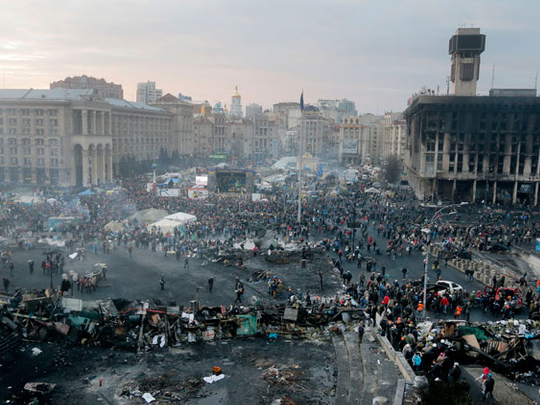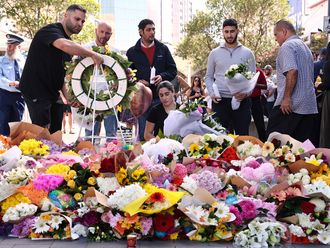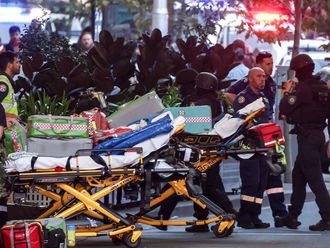
Kiev: Ukraine’s new government are a varied lot. Made up of 21 cabinet members, many are from Arseniy Yatsenyuk’s Fatherland party. A handful are drawn from the far-right nationalist Svoboda party. There is also a smattering of new faces, mainly activists who were prominent in the “Euromaidan” protests in Kiev and journalists. The Ukrainian Democratic Alliance for Reforms party of the heavyweight boxing champion-turned-politician Vitali Klitschko is not represented after it declined offers to participate in the new government.
Olexander Turchynov, Interim president
The deputy leader of Fatherland, Olexander Turchynov maintains very close ties with Yulia Tymoshenko, the controversial former prime minister who was jailed under the old regime. A 50-year-old from Dnipropetrovsk, many see his appointment as a move paving the way back to the political top spot for the recently released one-time gas-sector oligarch, Tymoshenko.
Turchynov had a prominent role in the Euromaidan protests and was placed under investigation by the security services of the former president Viktor Yanukovych for his involvement in organising the protesters’ “self-defence units”.
However, despite this, Turchynov was not popular with the crowd on Independence Square, known as the maidan. He attracted criticism from demonstrators when he told them that they had achieved their goals and should “go home” following Yanukovych’s departure.
Turchynov has a long political career and has previously held positions including head of Ukraine’s domestic security service [SBU], acting prime minister and deputy prime minister. WikiLeaks documents suggest that during his role as security service chief in 2005 he destroyed documents that allegedly implicated Tymoshenko as having links to organised crime.
Arseniy Yatsenyuk, Prime minister
The 39-year-old took the helm of Tymoshenko’s Fatherland party after the latter’s imprisonment in 2011.
Despite appearing on the Euromaidan stage with Tymoshenko immediately after her release, there is little love lost between the two. In the past phone calls have been leaked of Yatsenyuk shouting at Tymoshenko. The bespectacled new prime minister hails from the western Ukrainian city Chernivtsi, and has a reputation as a difficult man to work with and has had disputes with several of his party’s members.
He turned down the position of prime minister when the now-ousted Yanukovych offered it to him in January but he accepted the role following the Euromaidan protesters’ victory last month.
In the past Yatsenyuk has held several high-profile positions including head of the country’s central bank, the National Bank of Ukraine, foreign minister and parliamentary speaker.
He has played down his Jewish-Ukrainian origins, possibly because of the prevalence of anti-Semitism in his party’s western Ukraine heartland.
Oleksandr Sych, Deputy prime minister
Sych, 49, is a member of the far-right nationalist Svoboda (Freedom) party. He is an anti-abortion activist and once publicly suggested that women should “lead the kind of lifestyle to avoid the risk of rape, including refraining from drinking alcohol and being in controversial company”. He has attracted criticism from women’s and human rights groups.
Arsen Avakov, Interior minister
The social-media savvy Avakov has gained a reputation for using his Facebook page to broadcast updates on the law-and-order situation, and the new government’s actions, sometimes even before official press releases are made. Recent examples include the announcement of the disbanding of the Berkut riot police unit, notorious for their aggression towards antigovernment protesters, and the reaction to recent events in Crimea, which Avakov described as a “military invasion and occupation”.
Avakov is a member of the Fatherland party. In 2012-13 he lived in Italy after the Ukrainian authorities investigated him over the allegedly illegal privatisation of land. Italy refused to extradite him and he claimed the case was politically motivated. In 1990 Avakov founded and headed two financial firms, Investor and Bank Basis, which became the Commercial Bank in 1992.
Andriy Deshchitsya, Foreign minister
Deshchitsya, 50, is a career diplomat and was one of the first Ukrainian envoys to back the recent antigovernment demonstrations. He is mainly seen as a bureaucrat and previously held senior postings in Finland and Poland. Most recently he served as Ukraine’s representative to the Organisation for Security and Cooperation in Europe. He is one of the most politically neutral of the new appointments.
Andriy ParubiyNational security chief
A parliamentarian and member of the Fatherland party, Parubiy had a prominent role on the ground during the Euromaidan protests as so-called commander of the protest camp.
Parubiy was active in the struggle for Ukraine’s independence from the Soviet Union, which was achieved in 1991, and was one of the leaders of the 2004 Orange Revolution.
Dmitry Yarosh, Deputy national security leader
Yarosh heads a militant ultra-right-wing group Praviy Sektor (Right Sector), which surged to prominence during the Euromaidan demonstrations for its uncompromising stance.
Many attribute much of the protester-led violence including throwing molotov cocktails and rocks at the police to the group. Some western officials have expressed concern over the inclusion of Yarosh in the new government.
Dmytro Bulatov, Sports and youth minister
Bulatov, a 35-year-old businessman, was the leader of Avtomaidan (car maidan), a mobile patrol group who used their cars to protect the Euromaidan protesters from attacks bytitushki [a new slang term for government-hired thugs] roaming Kiev.
Bulatov was kidnapped in January and disappeared for eight days. When he resurfaced, he said men with Russian accents had kidnapped him and tortured him, including removing part of an ear. Bulatov fled to Lithuania temporarily amid fears for his safety in Ukraine.
Tetyana Chernovil
Another prominent activist who was rewarded, or compensated, for being beaten during the protests, Chernovil, 34, rose to fame for her investigations into top Ukrainian politicians and oligarchs. Two of her most renowned pieces of research were on the alleged organised crime connections of one of Ukraine’s most wealthy businessmen, Rinat Akhemetov, and the Yanukovych’s lavish countryside estate, Mezhyhirya, on the outskirts of Kiev.
When Yanukovych fled Ukraine, Chernovil posted on her Facebook page that she had been among the first to enter a property that she had investigated from the outside for so long.
During the Euromaidan protests, of which she was a vocal part, Chernovil’s car was rammed off the road and she was badly beaten by her assailants. At the time police claimed the attack had been motivated by “road rage” but Chernovil dismissed the claim as “ridiculous” and said the assault was clearly linked to her work. Her precise role in government remains unclear.












